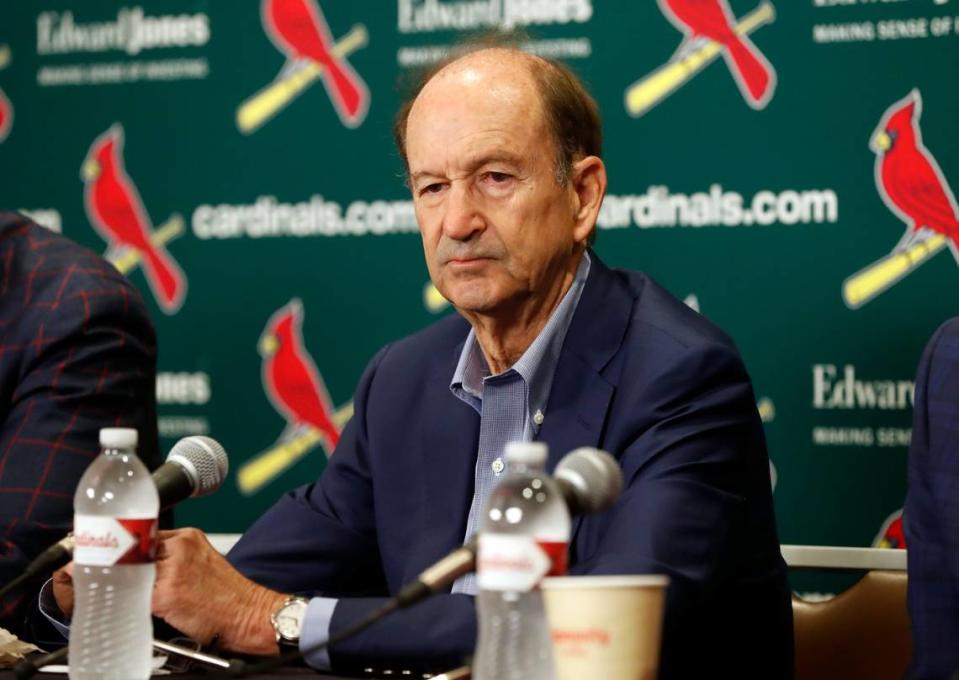DeWitt reaffirms Cardinals’ commitment to developing big league players, not buying them

The vision for the St. Louis Cardinals laid out by team chairman Bill DeWitt, Jr. and Bill DeWitt III on Monday was one of a team seeking to reclaim its status as an internal talent powerhouse which adds external help, even as it continues to drag through a winter with no guaranteed big league money allocated to new players and without any significant movement on the trade market.
“I’ve always been a draft-and-develop guy, and think that’s the best way to build a baseball team,” DeWitt Jr. said as the team wrapped up its annual Winter Warm-Up. “Back when we bought the club, that’s the path we took, and I think we’ve reached a point in time where it’s appropriate to focus on that and build the next championship Cardinal team.”
Nearly every player who took to the podium in the media center throughout the weekend was, in some form or another, asked to answer for the decisions of the ownership and front office. Bristling still at the word “rebuild,” the pick-your-own-re- Redbirds are nevertheless focused on shedding Nolan Arenado’s salary as they increase their (still comparatively smaller) investment in player development and reboot a minor league system that was, on Monday, literally a punch line.
“It was bad,” catcher-turned-first baseman Willson Contreras said of the minor league system, a smile creeping across his face as the room joined an uncertain chuckle. “Just being honest.”
The capital of the realm remains, well, capital.
A minor league system left to fall behind the competitive curve can be cured by investment, though at scale, even an aggressive retooling is far less expensive than maintaining a major league payroll. President of baseball operations John Mozeliak estimated the increase in player development spending at approximately 25% year over year, roughly double the estimate he provided at the team’s year-end press conference.
Even still, money is not finite for the Cardinals in the traditional sense. Revenues are certain to dip in 2025 with anticipated flagging attendance and an accepted cutback in the team’s local television rights fees, but given the explosion of franchise values since the group fronted by the DeWitts purchased the team in 1995, it’s hard to draw a clear line between that temporary setback and the overarching financial health of the franchise.
“We’ve always been in this for the long term,” DeWitt Jr. said when asked about the necessity of coupling revenues to payroll. “It’s not something we want to do on a yearly basis, is lose money. We’re not looking to make money. Obviously we’ve had years where we’ve had financial success, and we’ve had years when we’ve lost money, so I just don’t think it’s sound practice to look to lose money every year, if that’s what you’re referring to.”
DeWitt declined to say specify how often the team has, by his calculation, lost money in a given year, other than asserting their debts have increased and that they’re anticipating expenses over the coming years as they seek to renovate nearly 20-year-old Busch Stadium, working on areas such as plumbing and electrical which may not draw fan attention but which are necessary to keep the building functioning efficiently.
DeWitt III did speak briefly about the game experience and the team’s desire to “better identify our customers in this era of advanced technology and AI, and provide perhaps a more unique and customized entertainment experience for them.”
How those expenses may mount, how the developments will enhance fan experience, and whether that enhancement will be viewed in the long run as worth a designed step back from the competitive big league salary market is unclear.
Even as the ground underneath them shifts, new opportunities are arriving. This season is the first in which fans in the local St. Louis market will be able to purchase a direct-to-consumer streaming product to watch games which will rid them of MLB’s onerous blackout policy; DeWitt III said the team hasn’t yet finalized pricing for the service, but expects it to come in at roughly $20 per month. The Cardinals are also set to finally embark on an overhaul of their complex in Jupiter, Florida at the conclusion of spring training, subsidized in large measure by a bond issue passed by Palm Beach County.
While the Cardinals continue to search for a trade match for third baseman Nolan Arenado, DeWitt Jr. said Monday that the team does not need to make further salary cuts if no obvious match arises. That would suggest a degree of financial stability that, perhaps as much as championships or a particular brand of baseball, has been the true calling card of this ownership group’s time in St. Louis.
They are not, the DeWitts agreed, seeking to simply ride the wave of competitive cycles, trying to win with low-salary players and dumping those players as their earned pay increases. There is a belief, just as there was in the late 1990s, that the model for the Cardinals should be and can be high level consistency.
DeWitt Jr. spoke of a sign his late father, once the owner of the St. Louis Browns, kept on his desk, quoting legendary baseball executive Branch Rickey. “Get the players and the rest will take care of itself,” the sign read. DeWitt Jr. quipped that in today’s baseball landscape, he would phrase the slogan as, “get the players and develop them.”
The Cardinals are focused fully on the latter. The former will require a strategy, outside of the draft, still to be crafted.
“Competitive windows for middle to upper middle market teams can last a long time,” DeWitt III said. “For us to be able to go on a run like we just did the last 20 years, whether that can happen or not is an unknown.
“That’s why we watch the games. Nothing’s for sure, no guarantees, but that’s what we’re trying to build again.”

 Yahoo Sports
Yahoo Sports 
